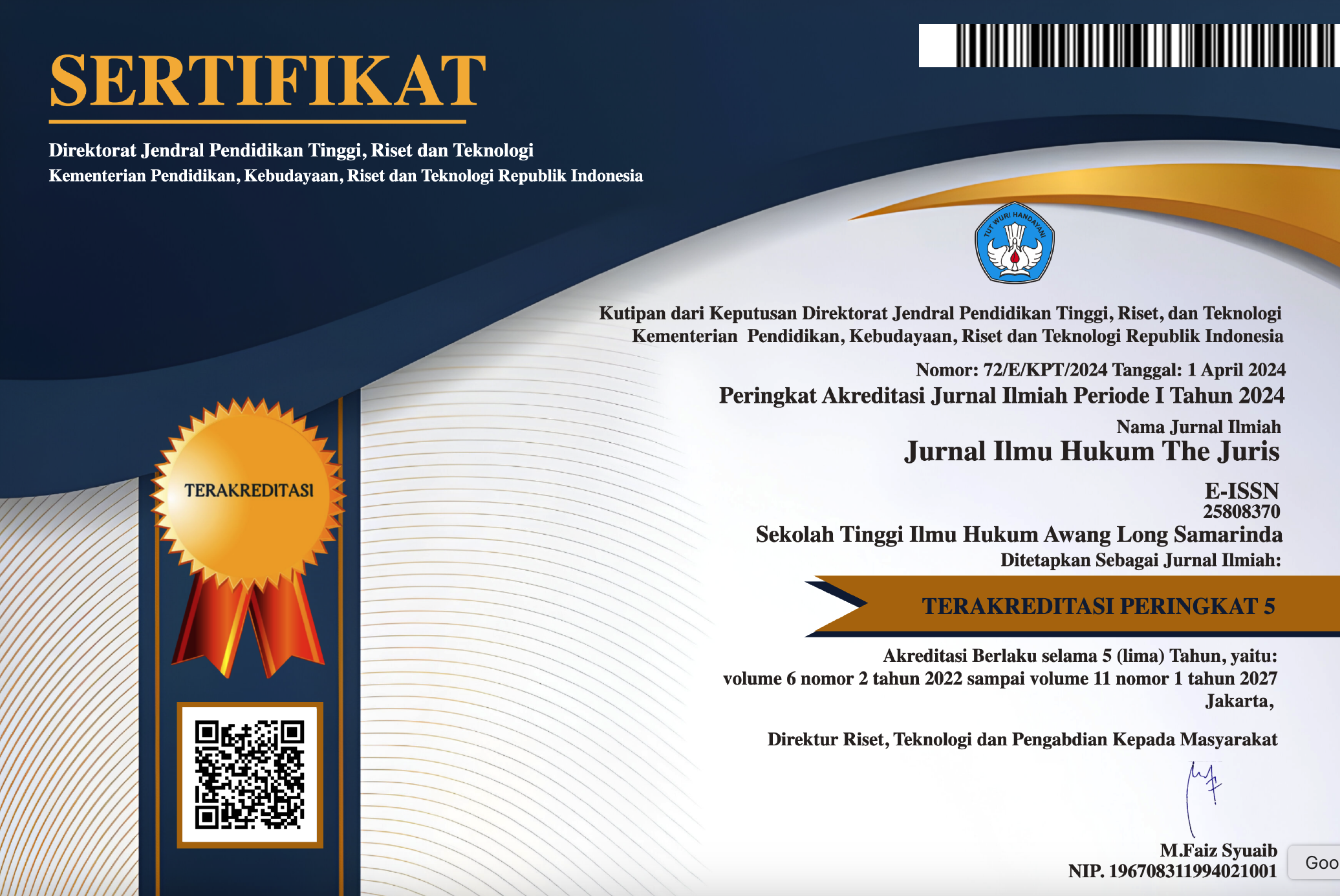IMPLEMENTASI PEMUNGUTAN RETRIBUSI PELAYANAN PASAR DI PASAR SIMPANG SARI PERSPEKTIF FIQH SIYASAH TANFIDZIYYAH
Abstract
Retribution refers to the payment imposed for the provision of market service facilities carried out by the local government. Its implementation must be conducted properly and in accordance with statutory regulations to ensure optimal benefits for the community. However, in practice, the collection of retribution fees at Simpang Sari Market differs from the stipulations outlined in Article 18, Paragraph (2) of the Regent Regulation of West Lampung Regency, which states: “Retribution officers are prohibited from altering or increasing the amount of the retribution fee.” In reality, the amount of retribution collected by officers diverges from the officially prescribed tariff. This study aims to investigate and analyze the implementation of market service retribution collection at Simpang Sari Market, and to examine it from the perspective of Fiqh Siyasah Tanfidziyyah (the Islamic theory of administrative governance). The research adopts a field research methodology using a descriptive approach, with data gathered through interviews and direct observation. Data were collected from pre-selected informants to ensure accuracy and relevance for this study. Although the local government has established regulations and provided implementation guidelines for the collection of market service retribution, several issues have emerged in practice. These include a lack of understanding among market vendors regarding the retribution system, poor coordination among collection officers, and the involvement of unauthorized individuals who collect fees outside the formal governmental structure.
Downloads
References
Abdullah, W. (2015). Disiplin Kerja dalam Islam. Jurnal Minds: Manajemen Ide Dan Inspirasi, 2(1), 153–169.
Atmuria, F., & Khaidir, A. (2020). Implementasi Peraturan Daerah Nomor 1 Tahun 2019 Tentang Retribusi Jasa Umum Dalam Pengelolaan Retribusi Pasar Di Pasar Raya Padang. Jurnal Ilmu Administrasi Negara ASIAN (Asosiasi Ilmuwan Administrasi Negara), 8(2), 91–101.
Doki, Rahmandha, Y., Andiko, T., & Mahdi, I. (2024). Implementasi Peraturan Pemerintah Nomor 94 Tahun 2021 Tentang Disiplin Pegawai Negeri Sipil Perspektif Fikih Siyasah Tanfidziyah Abstract : Abstrak : Pendahuluan Sumber daya manusia dalam operasional organisasi berperan sebagai faktor pendorong dan menent. 2(2), 300–320.
Fauzi, M. I., & Hamidah, T. (2021). Konsep amanah dalam al-qur’an. Al-Irfani: Journal of Al Qur’anic and Tafsir, 2(1), 14–25.
Gusmansyah, W. (2017). Trias Politica Dalam Perspektif Fikih Siyasah. Al Imarah: Jurnal Pemerintahan Dan Politik Islam, 2(2).
Hermanto, A., & Yuhani’ah, R. (2023). Pengantar Ilmu Fikih. Literasi Nusantara.
Hutasuhut, U. M., Zuhraini, Z., Hermanto, A., & Triono, T. (2022). Problematika Implementasi Kebijakan Kota Bandar Lampung dalam Mewujudkan Ketentraman dan Ketertiban Umum: Perspektif Siyasah Dusturiyah. As-Siyasi : Journal of Constitutional Law, 2(2), 133–148. https://doi.org/10.24042/as-siyasi.v2i2.12961
Iqbal, M. (2016). Fiqh Siyasah Konstekstualisasi Doktrin Politik Islam. Kencana.
Iqbal, M., & Madjid, N. (2001). Fiqh siyasah: kontekstualisasi doktrin politik Islam. Gaya Media Pratama.
Kadri, W., & Tumadi, N. H. (2022). Siyasah Syariyah & Fiqih Siyasah. Siyasah: Jurnal Hukum Tata Negara, 5(II).
Maulana, M. R., Fatimah, S. N., & Dewi, U. L. (2024). Islam Dan Lembaga Negara. An Najah (Jurnal Pendidikan Islam Dan Sosial Keagamaan), 3(4), 52–61.
Mottoh, R., Lengkong, F. D., & Laloma, A. (2022). Implementasi Kebijakan Retribusi Pasar Beriman di Kota Tomohon. Jurnal Administrasi Publik, 8(3), 182–191.
Nursansiwi, D. A., SE, M. A., Wardani, M., Ak, M., Ardiansyah, N., & Sos, S. (2022). Strategi Peningkatan Retribusi Daerah. CV Kreator Cerdas Indonesia.
Perbup. (2013). Peraturan Bupati Lampung Barat Nomor 8 Tahun 2013 Tentang Petunjuk Pelaksanaan Pemungutan Retribusi Pelayanan Pasar.
Prof. Dr. J. Suyuthi Pulungan, M. A. (2015). Fikih Siyasah. In Syria Studies (Vol. 7, Issue 1).
Ratna, I., & Silvi, H. (2023). Analisis Efektifitas Sistem Pemungutan Retribusi Pasar di Pasar Rumbio Kabupaten Kampar. Jurnal Perspektif Manajerial Dan Kewirausahaan (JPMK), 3(2), 130–135.
Ridwan, S. H. (2020). Fiqh Politik: Gagasan, Harapan, dan Kenyataan. Bumi Aksara.
Sa’diah, H., Setiawan, I., & Urahmah, N. (2024). Implementasi Peraturan Daerah Nomor 4 Tahun 2013 Tentang Retribusi Pelayanan Pasar di Pasar Paringin Kabupaten Balangan. Jurnal Kebijakan Publik, 1(2), 361–366.
Samsu, L. (2017). Al-Sulthah Al-Tasri’iyyah, Al-Sulthah Al-Tanfidziyyah, Al-Sulthah Al-Qada’iyyah. Tahkim, XIII(1), 171.
Sani, A. F. (2020). Pelaksanaan Peraturan Daerah Kota Pekanbaru Nomor 8 Tahun 2017 Tentang Retribusi Pelayanan Pasar Dalam Perspektif Fiqh Siyasah (Studi Kasus Di Pasar Rumbai Pekanbaru). 1–150.
Santoso, B. (1979). Pengantar ilmu hukum pajak. Eresco. https://books.google.co.id/books?id=fY05HAAACAAJ
Siahaan, M. P. (2005). Pajak daerah dan retribusi daerah.
Sidik, M. (2002). Optimalisasi pajak daerah dan retribusi daerah dalam rangka meningkatkan kemampuan keuangan daerah. Makalah Disampaikan Acara Orasi Ilmiah. Bandung, 10.
Simangunsong, F., & Hervina Puspitosari. (2021). Efektifitas Pengelolaan Retribusi Pasar Sebagai Sumber Pendapatan Asli Daerah Dan Upaya Penanggulangan Penyimpangan. Risalah Hukum, 17, 119–126. https://doi.org/10.30872/risalah.v17i2.707
Sos, J. P. S. (2020). Implementasi dan evaluasi kebijakan publik. Unisri Press.
Copyright (c) 2025 Reza Aprilia, Frenki, Agus Hermanto

This work is licensed under a Creative Commons Attribution-ShareAlike 4.0 International License.







